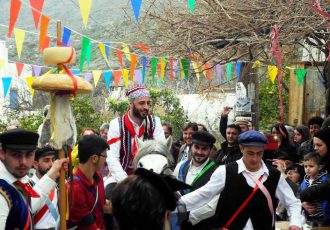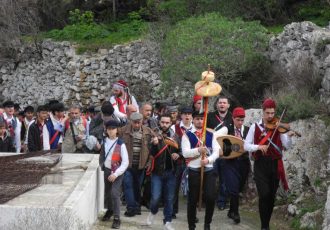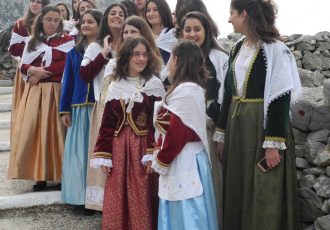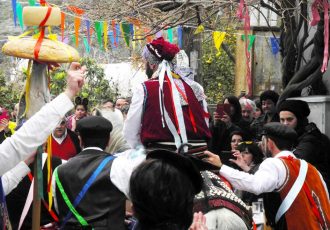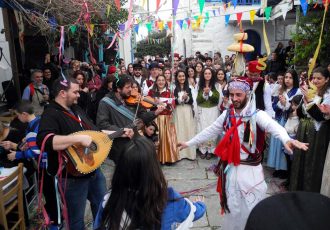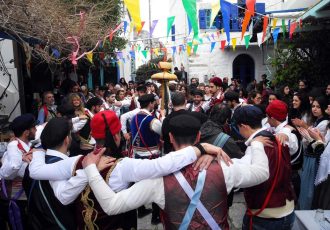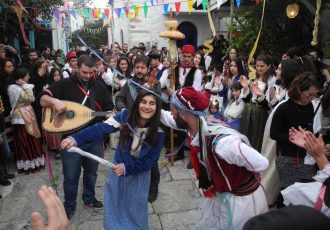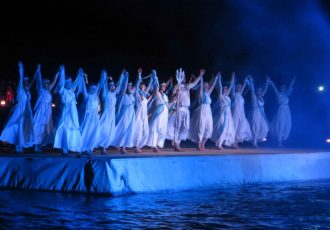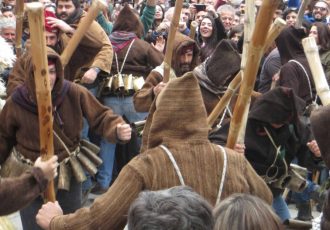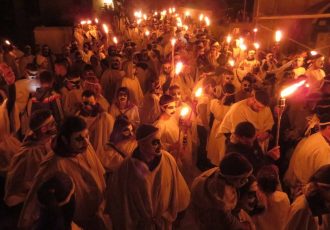Celebrating the beginning of Lent and the upcoming change of seasons, Carnival has always been a major moment in the Greek calendar. Marked by wild, colourful festivities, it has given the chance to Greeks to enjoy limitless fun in a row of celebrations where seemingly nothing is prohibited, an opportunity to freely escape the daily harsh routine.
Carnival traces its roots to the ancient cult of Dionysus (Bacchus), god of wine and theatre, and Christianity silently incorporated the dominant celebrations in the religious calendar, as a last wild enactment before the pious 40-day fast and preparation for Easter.
The vast variety of the Greek landscape and its traditions means that the Carnival Weekend offers endless options for fun and unique celebrations all over the country. The main concept of a street procession, often combined with rural, animal elements, can be found in numerous varieties from the most remote mountain villages of mainland Greece to coastal urban centres.
The Greek islands, both isolated and in connection with surrounding lands, have developed their own special festivities, which usually take place under the warm spring sun, a call for the upcoming summer.
Amorgos Island
The easternmost of the Cyclades group, well off the main communication routes for centuries in the past, Amorgos hosts its own, peculiar Carnival customs, unlike any other of its neighbouring islands.
During the three weeks of Carnival, groups of “Maskaroi” (disguised people) roam around the villages, marking their presence with improvised loud sounds and teasing fellow villagers. Maskaroi are disguised tip-to-toe in such a way that they cannot be recognized, and so they enter homes, cafés and restaurants, where they are welcomed with a shot of “raki” (local spirit) while the owners try to guess who they are. As the weeks go past, more and more groups of Maskaroi can be seen in the evenings and even once the Carnival is over, they keep their secret and never reveal to others who they were.
Carnival Sunday is a special day for the villages of Aegiali. “Kapetanios” (literally meaning captain, chief), a custom traced back to the days of Turkish occupation, has been revived during the last years, bringing together all inhabitants and visitors. At noon, the men of the village head to the church on the hill across, singing to the local sound of violin and oud. Once at the church, the “Kapetanios” is chosen among the young unmarried men of the village. The celebration continues as he and his accompanying “Bairachtaris” (man carrying the leading pole) are groomed by fellow villagers. Kapetanios then rides the horse and follows his Bairachtaris, holding a pole on the top of which there is a loaf of bread, cheese and an octopus. The procession heads back to village, at the entrance of which the local young women await to join the party. Men and women then walk along the alleys, singing together and sharing shots of “raki” from the shop and café owners welcoming them. Once back at the main square, the Kapetanios shows his abilities riding the horse, before getting off, dancing with his companions and then choosing his “Kapetanissa” among the girls of the village. The couple shares a first dance before being accompanied by the rest of the village to a feast that goes on until well after midnight.
“Kathara Deftera” (Clean Monday) is a day of joy and more tranquil celebrations. As in the rest of Greece, locals head for the nearby beach in the morning, where they fly colourful kites to the sky. At noon, they gather in the village centre to share the traditional meal of the day: “lagana” (traditional flatbread, originally prepared without yeast), “taramosalata” (Greek caviar paste), seafood, beans and other fasting delicacies.
Naxos Island
Considered as the island of Dionysus since antiquity, it is no surprise that Naxos hosts perhaps the most impressive and rich Carnival Weekend of the whole Cyclades group.
Celebrations begin the week prior to Carnival Weekend and each of its villages holds its own colourful and loud traditions. “Kordelatoi” and “Foustanelatoi” (men wearing the traditional “foustanela”, a kind of Greek kilt, adorned with colourful stripes), go from one village to another in order to dance with local women. Every day up to Carnival Sunday is assigned to one or more villages and the meetings conclude to fun, music and dance.
In the capital, Chora, celebrations begin on Friday night at the port, where the enactment of a story from the ancient Greek mythology takes place below the impressive setting of Portara. Usually related to Dionysus, this year the play revived the story of Poseidon, god of the sea, and the sea nymph Ampitrite. The show ends with a feast with music and wine where participants and spectators are invited to the fun.
On Saturday night, the impressive “Lampadiforia” (torch procession) dominates the town, as hundreds of white dressed people descend from the castle down to the port holding lit torches to the beat of drums and bells. The long procession passes by the neighbourhoods of Chora as it carries the Carnival King (leading cart) towards the main square, where hours of music and dance will close the celebration. At the back end of the procession, the evil scare crow follows, which is burnt upon arrival at the main square at the port as men jump across its flaming body.
Carnival Sunday is particularly special in the villages of Naxos. Perhaps the most famous of celebrations, “Koudounatoi”, takes place in the mountain village of Apiranthos. The rituals related to Koudounatoi are traced back in antiquity and are directly related to ancient celebrations in honour of god Dionysus. Men covered with the traditional coat wear a belt with hanging bells and walk along the streets and main square of the village. Their dancing movement makes the bells create a very loud sound in order to clear away the bad spirits. Holding large sticks that symbolize the Dionysian phallus, Koudounatoi challenge each other and anyone who interacts with them as they run across the cobbled streets. The feast continues with traditional dance and live music to the sound of “tsabouna” (Greek bagpipe), following the enactment of a wedding that takes place in the main square.
On Clean Monday, kites are flown in the sky, especially in the area of Agia Anna, a popular summer resort close to Chora, where restaurants and bars open again after a calm winter.

